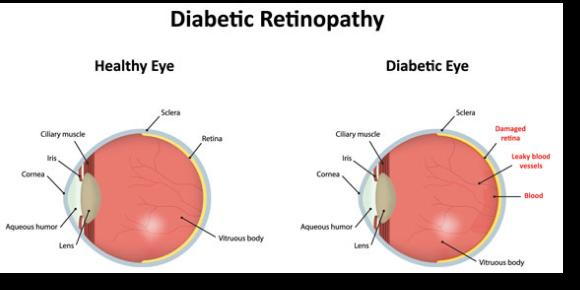
Diabetic retinopathy, a complication of diabetes, is caused by damage to the blood vessels of the light-sensitive tissue at the back of the eye (the retina). While it may initial present with no symptoms or mild vision problems, it can eventually cause complete vision loss.
Two Stages
There are two stages of diabetic retinopathy. In its early form, the walls of the blood vessels in the retina begin to weaken. Tiny bulges, known as microaneurysms, protrude from the vessel walls of smaller vessels. These bulges may leak fluid and blood into the retina. Larger retinal vessels may begin to dilate and become irregular in size. The disease will progress from mild to severe as more vessels become blocked. Additionally, nerve fibers in the retina may start to swell, and in some cases, the macula also begins to swell (termed macular edema), a condition that will require treatment.
In advanced diabetic retinopathy, also known as proliferative diabetic retinopathy, damaged blood vessels close off, causing the growth of new, abnormal blood vessels in the retina, which may then leak into the vitreous, the substance that fills the center of the eye.
Over time, the eye will attempt to grow new blood vessels to replace the ones that have become blocked, but these new vessels do not work properly and, if untreated, will eventually stimulate scar tissue. The scar tissue may then cause the retina to detach from the back of the eye. If the new vessels disturb the normal flow of fluid out of the eye, pressure can build up in the eyeball and damage the optic nerve, resulting in glaucoma.
Who Is at Risk?
Anyone with type 1 or 2 diabetes may develop diabetic retinopathy. The longer a person has lived with diabetes and the less controlled their blood sugar, the higher their risk for developing this condition. High blood pressure, high cholesterol, pregnancy, tobacco use and certain ethnicities also carry increased risk factors.
Once diabetic retinopathy has progressed past the early stages, which are often undetectable expect by an eye care professional, symptoms may include the following:
- Spots or floaters in your vision
- Blurred vision
- Fluctuating vision
- Impaired color vision
- Dark or empty areas in your vision
- Vision loss
The condition generally affects both eyes.
Disease Management and Treatment
Eating well, exercising and managing the underlying diabetes are keys to living with diabetic retinopathy. A healthy diet, at least 150 minutes of moderate aerobic activity each week and taking insulin and other medications and prescribed by your doctor will go a long way in slowing progression of the condition.
Those diagnosed with diabetic retinopathy (and diabetes in general) will also need to monitor their blood sugar level throughout the day. Affected individuals should also work to control their blood pressure and cholesterol (see above on healthy eating and exercise habits, and medications can be of assistance here, too).
Tobacco users should make a concerted effort to quit, as smoking increases your risk of diabetes (and its retinopathic counterpart). For those struggling to leave tobacco behind, your doctor may be able to help.
Lastly, see your optometrist for regular vision exams to monitor any changes. Diabetic retinopathy doesn’t have to lead to vision loss, but it does require consistent and dedicated management of the underlying diabetes.
To learn more about Diabetic Retinopathy and the importance of regular eye exams if your diabetic please watch the following videos: http://fyi.rendia.com/Nbx9TW and http://fyi.rendia.com/btD5Y
